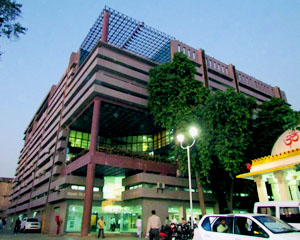AMC installs biogas plants at stray cattle shelters; recycles 2,500 kg of daily cattle waste
May 12, 2025
Ahmedabad: The city civic body repurposes around 2,000 kg of dung and green waste generated daily from its stray cattle shelters in Danilimda and Bakrol, according to an official press release issued today.
Under the Stray Animal Prevention and Control Policy–2023, to tackle the stray cattle menace, animals caught by the Ahmedabad Municipal Corporation (AMC) are relocated to Karuna Temples at Danilimda and Bakrol. These facilities provide care including fodder, water, medical treatment, supervision, and general upkeep.
Over 2,500 kg of dung and green waste is generated daily. In line with the principles of “Reduce, Reuse, Recycle, Resource, and Repurpose” and the “Circular Economy” model outlined in the 2024–25 Budget, AMC repurposes around 2,000 kg of this manure each day.
This waste is transported to the garden department’s site in Gyaspur, where it is processed into fertilizer and used across 62 municipal gardens. Additionally, it supports seedling cultivation, nursery work, and soil enrichment. Cow dung and dry grass are also used to make eco-friendly sticks and compost, which are distributed for traditional Vedic Holi celebrations and funeral rites in city crematoriums.
In 2025, AMC distributed dung-based sticks at 57 locations across seven zones, enabling residents to celebrate a sustainable Vedic Holi.
Features of the biogas plants installed at Bakrol and Danilimda Karuna Temples:
- Capital cost: ₹32 lakh
- Daily input: 1 ton of green waste (dung, fodder, etc.)
- Biogas output: 50 kg per day, usable in community kitchens and canteens
- Usage plan: Biogas will be used to prepare tea, coffee, snacks, etc., for visitors to the Karuna Temples
- Electricity generation: 40 units per day, used for lighting the premises and reducing electricity bills
- Slurry use: A soil-enriching by-product to be used in nurseries and organic farming
- Biogas fertilizer: Suitable for kitchen gardens, nurseries, and organic farming
- Input sources: Organic green waste including vegetables, flowers, fruits, leaves, food waste, hotel and kitchen waste, and horticultural waste
- Soil benefits: Improves fertility through organic bio-fertilizer and soil enrichment
- Environmental impact: A significant step toward a “Zero Waste City”
Recent Stories
- DGCA asks airlines to conduct mental health workshops for crew after AI 171 crash
- Blast rocks Hong Kong-flagged vessel off Gujarat coast; 21 crew evacuated
- AERB grants 5-year operational license to Kakrapar's 700 MW indigenous reactors
- 24 hours rainfall data from across Gujarat; South Gujarat, Kutch top the chart
- Schools, colleges declared shut in Navsari following heavy rains, rising levels in rivers
- Shah in Anand hails Salt Cooperative Initiative of Kutch, predicts Rs. 1 lakh crore Turnover of Amul next year
- Section 144 imposed after arrest of AAP MLA Chaitar Vasava
